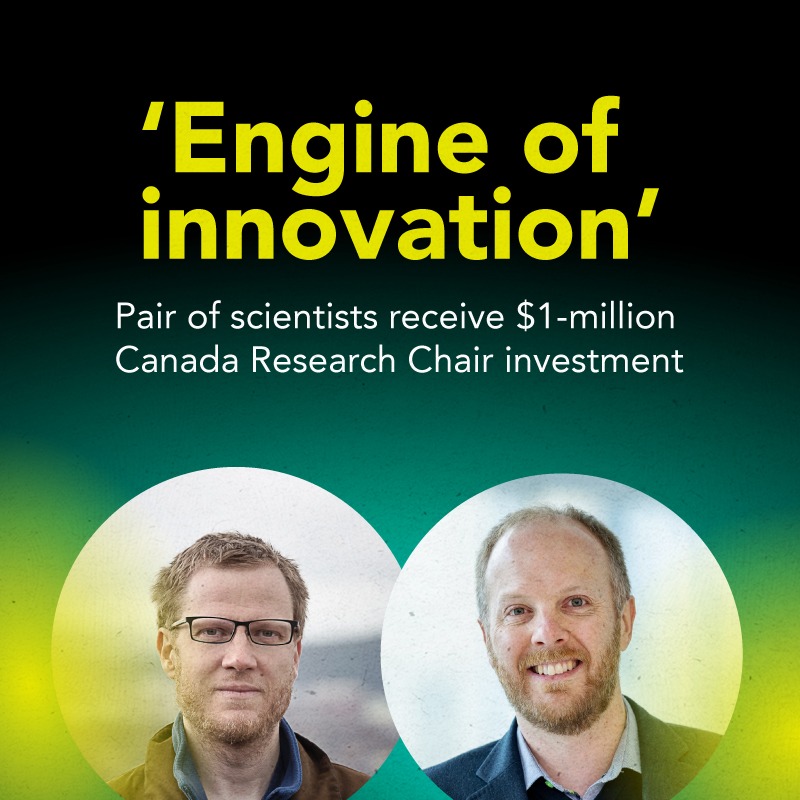'Engine of innovation': Pair of scientists receive $1-million Canada Research Chairs investment

A major federal investment is ensuring two researchers will further their research ranging from climate change to marine mineral resources.
Drs. Alex Bihlo and John Jamieson have been renewed as tier 2 Canada Research Chairs (CRC).
Tier 2 chairs are five-year awards for $100,000 each year.
The news was announced on June 15 as part of a larger research announcement that included funding from the Natural Sciences and Engineering Research Council of Canada and the Social Sciences and Humanities Research Council of Canada for Memorial researchers.
Dr. Bihlo, associate professor, Department of Mathematics and Statistics, Faculty of Science, continues his work as Memorial’s Canada Research Chair in Numerical Analysis and Scientific Computing.
Dr. Jamieson, assistant professor, Department of Earth Sciences, Faculty of Science, has been renewed as Memorial’s Canada Research Chair in Marine Geology.
Both researchers were initially appointed as CRCs in 2016.
Specialized capacity
“The Canada Research Chairs program allows Memorial to recruit and retain the next generation of emerging scholars and established scientists to Newfoundland and Labrador,” said President Vianne Timmons.
“Critical investments by the Government of Canada empower our researchers, allowing them to build specialized capacity and lead groundbreaking work. I congratulate Drs. Bihlo and Jamieson on their re-appointments.”
‘Exciting’ research
Dr. Bihlo says the CRC investment allows him to hire more students and post-doctoral researchers, and expand his research program.
Trained as an applied mathematician and meteorologist, Dr. Bihlo incorporated machine learning in traditional scientific computing and what problems can be solved now that were previously out of reach.
“In terms of applications, everything related to the atmospheric sciences and climate modelling comes to mind here,” he said.
“That’s what my group has been working on using traditional methods from numerical analysis and applied mathematics. How can we leverage recent breakthroughs in machine learning without sacrificing the rigor of traditional mathematical tools?”
As an early-career researcher, Dr. Bihlo acknowledges the support he has received from the Memorial community, including his department and faculty.
“That’s something I’ll never take for granted,” he noted.
“I feel privileged being able to do what I love and being able to do that professionally 365 days a year. Getting up in the morning being able to do what I love is really all I fundamentally care about. Having a framework like the CRC obviously simplifies this a bit, as it allows me to do more in terms of research as I’d be able to do otherwise.”
‘Humbling feeling’
Dr. Jamieson says his initial reaction to his five-year renewal was relief.
“This stemmed from the amount of effort and time that went into my renewal application,” he explained, noting colleagues in the Department of Earth Sciences, the Faculty of Science, the Strategic Institutional Research Initiatives office, a unit within the vice-president (research) portfolio, and external references contributed to the success of the application.
“I was relieved that I did not let any of them down.”
Dr. Jamieson says it’s also a “humbling feeling” to be recognized for work conducted during his first term as CRC, which included setting up his lab, teaching and 51 weeks at sea.
He says the renewal will provide essential support to him and his research group to continue extensive collaboration with national and international partners.
“The specific questions … have evolved significantly due to the knowledge and experience gained from the past five years.”
He also says the chair renewal allows for flexibility and adaptability, which are critical for research that relies on ocean-going expeditions that are subject to disruption due to weather, scheduling, technical challenges, geopolitics and pandemics.
“Overall, my research interests will continue to focus on deep sea hydrothermal vents, the exploration of the seafloor and marine mineral resources. However, the specific questions and methodologies that will be addressed during this next term have evolved significantly due to the knowledge and experience gained from the past five years.”
‘Engine of innovation’
Dr. Neil Bose, vice-president (research), says the federal investment will help further position Memorial as a hub for world-leading research.
“As Newfoundland and Labrador’s university, Memorial is an engine of innovation,” said Dr. Bose, a former CRC.
“Our multidisciplinary scholars and scientists such as Drs. Bihlo and Jamieson are tackling critical global issues. I am very pleased to see this support and wish them both much luck as they continue their cutting-edge research.”
Jeff Green is manager of communications in the Office of the Vice-President (Research). He can be reached at jeffg@mun.ca.